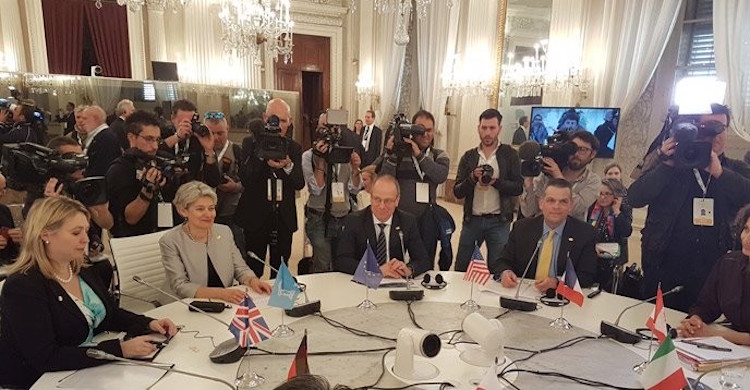By A.D. McKenzie
PARIS (IDN) – For the first time, leaders of the world’s seven major industrialised countries have adopted a common declaration for the protection of cultural heritage, recognising the “distinctive role” that culture plays in promoting dialogue and reconciliation.
Culture ministers and other cultural representatives from the G7 countries (Canada, France, Germany, Italy, Japan, the United Kingdom, and the United States) and the European Union, adopted the “Florence Declaration” at an unprecedented meeting in Florence, Italy, at the end of March.
UNESCO, the United Nations’ cultural agency which has long been pushing for such international recognition, was also represented.
Experts are now working on how to develop “common and coordinated action” to strengthen the safeguarding of cultural heritage, especially in areas affected by armed conflict.
“When a country is in an emergency situation, there are several ways to rebuild and to provide resilience to the constituents, and culture is one way to recover,” says Edouard Planche, UNESCO specialist in charge of the programme of fighting against illicit traffic in cultural items.
“When people are disconnected from their heritage – whether that is physical cultural heritage or intangible heritage – they are not able to rebuild effectively. This is why culture is so important to peace-building,” Planche told IDN in an interview.
The G7 meeting took place shortly after a historic UN Security Council adoption of a resolution on the Protection of Cultural Heritage in the Event of Armed Conflict. The latter stemmed from an initiative by France and Italy, two countries that have many World Heritage Sites and where culture and the “creative industries” have economic significance.
According to analysts, alongside the global concern about the trafficking of stolen art objects, governments are also concerned that such trafficking is increasingly being used to fund organised crime and terrorism, and this is one of the reasons why coordinated international action is necessary.
“It appears that the fight against illicit trafficking of cultural items is now of international concern,” Planche told IIDN. “Terrorist groups are using threats to culture to destabilise populations. The destruction of cultural sites is being used to make people feel unsafe. Trafficking is one way to buy arms.”
UNESCO says that it is crucial to unify the international legal framework and increase the ratifications of international treaties. The agency has also been promoting public participation and awareness with its Unite4Heritage campaign, in the face of destruction of cultural sites in countries such as Iraq and Syria.
“The deliberate destruction of heritage is a war crime – it has become a tactic of war, to undermine societies, to paralyse communities, to spread hatred, to fuel revenge, in a global strategy of cultural cleansing,” said UNESCO’s Director-General Irina Bokova.
“This is inacceptable and it calls for stronger and appropriate responses. Defending cultural heritage is more than a cultural issue – it is a security imperative, inseparable from that of defending human lives,” she stated.
In the G7 Florence Declaration, culture ministers expressed their “deep concern at the ever-increasing risk, arising not only from terrorist attacks, armed conflicts and natural disasters but also from raids, looting and other crimes committed on a global scale, to cultural heritage and all related institutions and properties, such as museums, monuments, archaeological sites, archives and libraries”.
The ministers said they supported UNESCO’s role in promoting the protection and preservation of cultural heritage, and they urged the organisation and other agencies to “strengthen their activities, within their existing mandates, for the protection of cultural heritage and to continue these activities in a coordinated way.”
The protection of cultural heritage is at the centre of UNESCO’s mandate, according to the organisation, which has urged UN member states to take into consideration “culture as a pillar of sustainable development goals”.
In measures to move forward with the new Declaration, Italy has proposed creating a special unit of the Blue Helmets, who would be responsible for cultural heritage – educating other soldiers and the local population. NGOs could also be involved in this, but they are usually engaged in dealing with emergency situations, Planche said.
UNESCO says that part of its priority is to work more closely with armed forces and to provide training in protecting cultural heritage.
At the national level of the countries involved, customs officials also need further training and education about the import and export of art objects, especially because controlling imports is among relatively new measures being taken.
Planche points out, for instance, that 15,000 objects were stolen from Iraq’s National Museum, and that 10,000 pieces are still missing. Many of these must have passed customs controls without questions.
Meanwhile, the G7 ministers stressed their wordy belief “that cultural heritage, in all its forms, tangible and intangible, movable and immovable, being an extraordinary link between past, present and future of mankind: contributes to the preservation of identity and memory of mankind and encourages dialogue and cultural exchanges among nations, thereby fostering tolerance, mutual understanding, recognition and respect for diversity”. [IDN-InDepthNews – 24 April 2017]
Photo: UNESCO Director-General, Irina Bokova (second from left), participated in the first ever G7 Culture Ministers’ meeting held on 30 and 31 of March 2017 in Florence, Italy. Credit: UNESCO.
IDN is flagship agency of the International Press Syndicate
facebook.com/IDN.GoingDeeper – twitter.com/InDepthNews

